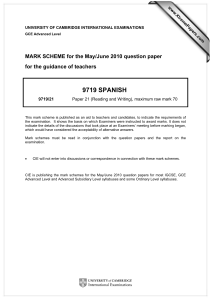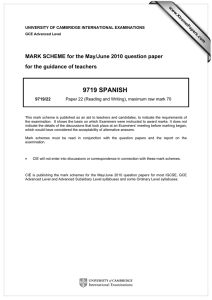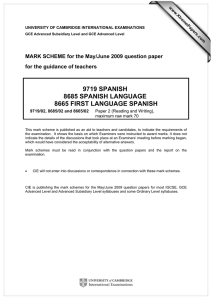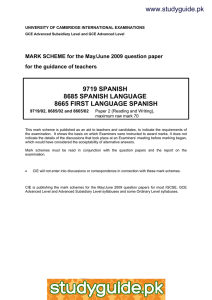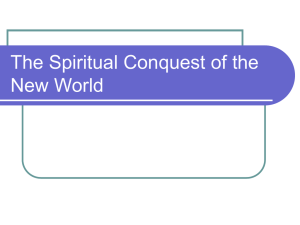9719 SPANISH MARK SCHEME for the May/June 2012 question paper
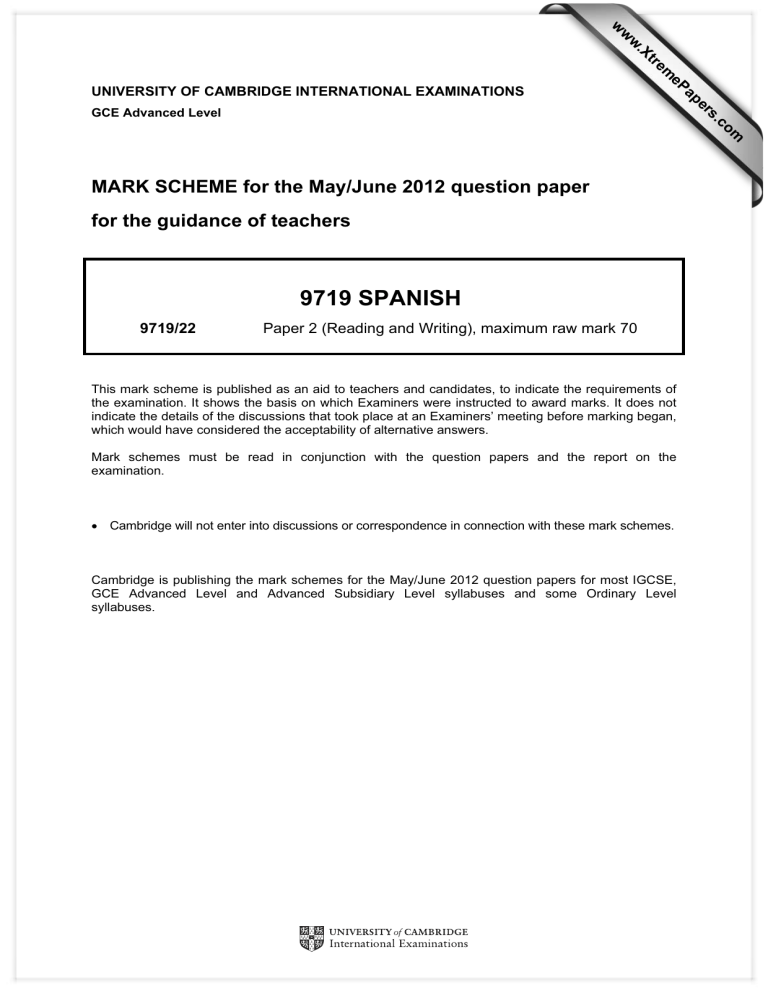
www.XtremePapers.com
UNIVERSITY OF CAMBRIDGE INTERNATIONAL EXAMINATIONS
GCE Advanced Level
MARK SCHEME for the May/June 2012 question paper for the guidance of teachers
9719 SPANISH
9719/22
Paper 2 (Reading and Writing), maximum raw mark 70
This mark scheme is published as an aid to teachers and candidates, to indicate the requirements of the examination. It shows the basis on which Examiners were instructed to award marks. It does not indicate the details of the discussions that took place at an Examiners’ meeting before marking began, which would have considered the acceptability of alternative answers.
Mark schemes must be read in conjunction with the question papers and the report on the examination.
• Cambridge will not enter into discussions or correspondence in connection with these mark schemes.
Cambridge is publishing the mark schemes for the May/June 2012 question papers for most IGCSE,
GCE Advanced Level and Advanced Subsidiary Level syllabuses and some Ordinary Level syllabuses.
Page 2 Mark Scheme: Teachers’ version Syllabus Paper
GCE A LEVEL – May/June 2012 9719
Section 1
1 Rubric: Busca expresiones en el texto que sean equivalentes a las que aparecen abajo:
22
Refuse answers which have the correct phrase but have additional words at beginning or end.
Allow minor errors in copying correct phrase.
(a) lejos del rugido de la civilización allow ruido
(apartado del ruido de las ciudades)
(b) tendrá listo el primer prototipo (estará preparado el modelo inicial)
(c) para satisfacer toda la demanda
[1]
[1]
(con el objetivo de cubrir completamente las necesidades) [1]
(d) los costes dificultaban su realización
(e) el coste necesario para reemplazar
(los gastos impedían el progreso)
(el importe requerido para sustituir)
[1]
[1]
[Total: 5 puntos]
© University of Cambridge International Examinations 2012
Page 3 Mark Scheme: Teachers’ version
GCE A LEVEL – May/June 2012
Syllabus
9719
Paper
22 la forma exacta de la palabra o las palabras que aparecen entre paréntesis ( ).
The following are examples of the way in which the answers could be expressed. Answers should fit into the original text, retaining the same meaning, and contain all elements of the phrase to be re-worked.
(a) un sistema innovador está siendo desarrollado por un ingeniero [líneas 2-3]
(desarrollando) un ingeniero está desarrollando un sistema innovador
Refuse definite article(s)
[1]
(b) sueña con el proyecto desde hace muchos años [línea 9] (lleva)
Lleva muchos años soñando con el proyecto
Lleva soñando con el proyecto muchos años
Lleva soñando con el proyecto desde hace muchos años
Desde hace muchos años lleva soñando con el proyecto
Hace muchos años que lleva soñando con el proyecto
Refuse soñando del
(c) bastaría con instalar convertidores solares [líneas 10-11] (suficiente)
Sería suficiente (con) instalar convertidores solares
(con) instalar convertidores solares sería suficiente conditional needed
[1]
[1]
(d) el precio final sería comparable [línea 18] (comparar) el precio (final) se podría comparar se podría comparar el precio (final) conditional needed
(e) El objetivo es capturar hasta 17000 horas de luz [línea 28] (se espera que)
Se espera que (se) capturen (hasta) 17000 horas de luz
Se espera que (se) capturarían/ capturarán...
Se espera que (se) puedan / podrían / podrán capturar...
Se espera que (hasta) 17000 horas de luz sean / serán / serían capturadas
Se espera que se consigan capturar...
Refuse estén etc capturadas
Refuse 3rd pers sing verbs eg Se espera que se pueda etc capturar...
[1]
[1]
[Total: 5 puntos]
© University of Cambridge International Examinations 2012
Page 4 Mark Scheme: Teachers’ version Syllabus Paper
GCE A LEVEL – May/June 2012 9719 22
3 Rubric: Contesta en español las siguientes preguntas, sin copiar frases completas (más de 4 palabras consecutivas) del texto .
NB Lifting = more than 4 consecutive words taken from the text and will usually invalidate answer unless further original explanation is offered.
(a) ¿Cómo podríán cambiar nuestra vida los paneles solares de Johnson?
(párrafo 1)
[3]
Cambiará cómo viajamos
Cambiará la forma en que obtendremos energía
Cambiará el modo en que se utilizara la infraestructura disponiblede carreteras /
Cambiará el modo en que se utilizaran las carreteras
Refuse Cambiará el modo en que se utilizara la infraestructura (no mention of roads)
[1]
[1]
[1]
(b) ¿Qué elementos hacían imposible el proyecto de Johnson hasta ahora? (párrafo 2) [3]
El precio (del proyecto no era viable)
No había la tecnología necesaria
[1]
[1]
No existía el suficiente tramo de carreteras asfaltadas ( needed ) [1]
(c) ¿Qué es necesario para que sea rentable el proyecto de Johnson? y ¿cómo justifica que su proyecto es rentable?
(párrafo 3) [3]
Cuando se fabriquen los paneles por (un promedio de) 5000 dólares
La vida del panel es larga / 21 años / muchos años
El coste de construcción de las carreteras solares será igual al de las carreteras tradicionales (needed)
[1]
[1]
[1]
(d) ¿Qué ventajas tendrán las carreteras inteligentes de Johnson?
(párrafo 4) [4]
Podrán derretir la nieve
Mandarán noticias a los conductores / sobre el tráfico
500 casas tendrán energía por cada 1.5Km de carretera solar allow good generalisations eg suministrarán energía a un gran número de hogares
Podrán cargar (las baterías de) coches eléctricos
[1]
[1]
[1]
[1]
(e) ¿Para qué sirven los 'árboles solares'?
(párrafo 5)
[2]
Dan sombra
Generan energía / capturan luz
[1]
[1]
© University of Cambridge International Examinations 2012
Page 5 Mark Scheme: Teachers’ version
GCE A LEVEL – May/June 2012
Quality of Language – Accuracy (Questions 3, 4 and 5)
Syllabus
9719
Paper
22
[5]
Consistently accurate. Only very few errors of minor significance. Accurate use of more complex structures (verb forms, tenses, prepositions, word order).
4 Good
Higher incidence of error than above, but clearly has a sound grasp of the grammatical elements in spite of lapses. Some capacity to use accurately more complex structures.
3 Sound
Fair level of accuracy. Common tenses and regular verbs mostly correctly formed. Some problems in forming correct agreement of adjectives. Difficulty with irregular verbs, use of prepositions.
Persistent errors in tense and verb forms. Prepositions frequently incorrect. Recurrent errors in agreement of adjectives.
0–1 Poor
Little or no evidence of grammatical awareness. Most constructions incomplete or incorrect.
Consistent and repeated error.
Note re questions 3 and 4: The five marks available for quality of language are awarded globally for the whole performance on each set of answers.
A concise answer, containing all mark-bearing components for content is scored on the full range of marks for language, i.e. length does not determine the quality of language mark.
An individual answer scoring 0 for content cannot contribute to the overall Quality of Language mark.
This means that the total mark out of 5 available on the whole set of answers is reduced on the following scale:
Answer(s) worth a total of 2 or 3 scoring 0: reduce final assessment by 1
Answer(s) worth a total of 4 or 5 scoring 0: reduce final assessment by 2
Answer(s) worth a total of 6 or 7 scoring 0: reduce final assessment by 3
Answer(s) worth a total of 8 or 9 scoring 0: reduce final assessment by 4
Note : A minimum of one mark for Quality of Language should be awarded if there are any content marks at all (i.e. 0 language marks only if 0 content marks).
[Total: 20]
© University of Cambridge International Examinations 2012
Page 6 Mark Scheme: Teachers’ version Syllabus Paper
GCE A LEVEL – May/June 2012 9719 22
Section 2
4 Rubric: Contesta en español las siguientes preguntas, sin copiar frases completas (más de 4 palabras consecutivas) del texto .
NB Lifting = more than 4 consecutive words taken from the text and will usually invalidate answer unless further original explanation is offered.
(a) ¿Por qué es necesario tomar medidas en torno al transporte? (párrafo 1) [3]
Contribuye al calentamiento de la tierra
Refuse over-generalisations which don't equate to the percentages:
Se ha incrementado en un 90% las emisiones de CO
2
El transporte produce un 25% de los gases que producen el efecto invernadero
[1]
[1]
[1]
(b) ¿Cuáles son los objetivos de la ‘Semana de la Movilidad Sostenible’? (párrafo 2) [3]
Hacer que la población se dé cuenta de lo significativo del transporte sostenible
Purificar / mejorar el aire de las ciudades
Combatir el cambio climático
[1]
[1]
[1]
(c) Según Roldán, ¿qué se necesita para hacer más sostenibles los deplazamientos?
(párrafo 3) [2]
Reducción del tráfico
Alto nivel de cooperación ciudadana
[1]
[1]
(d) ¿Qué medidas se sugieren para solucionar el problema del coche?
(párrafo 4)
Usar transporte alternativo (bici, andar)
Mejorar el transporte público
Promocionar compartir coches entre usuarios
Limitar la posibilidad de aparcar
[4]
[1]
[1]
[1]
[1]
(e) ¿Por qué no está muy extendido el uso de la bicicleta en España?
(párrafo 5)
[3]
El ciudadano piensa que (needed) no es seguro
No tiene una buena imagen
Refuse hay un problema cultural without further development
No hay gente conocida/con altos cargos/modelos a seguir que usen la bicicleta
[Total:
[1]
[1]
[1] puntos]
© University of Cambridge International Examinations 2012
Page 7 Mark Scheme: Teachers’ version
GCE A LEVEL – May/June 2012
Quality of Language – Accuracy (Questions 3, 4 and 5)
Syllabus
9719
Paper
22
Consistently accurate. Only very few errors of minor significance. Accurate use of more complex structures (verb forms, tenses, prepositions, word order).
4 Good
Higher incidence of error than above, but clearly has a sound grasp of the grammatical elements in spite of lapses. Some capacity to use accurately more complex structures.
3 Sound
Fair level of accuracy. Common tenses and regular verbs mostly correctly formed. Some problems in forming correct agreement of adjectives. Difficulty with irregular verbs, use of prepositions.
[5]
Persistent errors in tense and verb forms. Prepositions frequently incorrect. Recurrent errors in agreement of adjectives.
0–1 Poor
Little or no evidence of grammatical awareness. Most constructions incomplete or incorrect.
Consistent and repeated error.
Note re questions 3 and 4: The five marks available for quality of language are awarded globally for the whole performance on each set of answers.
A concise answer, containing all mark-bearing components for content is scored on the full range of marks for language, i.e. length does not determine the quality of language mark.
An individual answer scoring 0 for content cannot contribute to the overall Quality of Language mark.
This means that the total mark out of 5 available on the whole set of answers is reduced on the following scale:
Answer(s) worth a total of 2 or 3 scoring 0: reduce final assessment by 1
Answer(s) worth a total of 4 or 5 scoring 0: reduce final assessment by 2
Answer(s) worth a total of 6 or 7 scoring 0: reduce final assessment by 3
Answer(s) worth a total of 8 or 9 scoring 0: reduce final assessment by 4
Note : A minimum of one mark for Quality of Language should be awarded if there are any content marks at all (i.e. 0 language marks only if 0 content marks).
[Total: 20]
© University of Cambridge International Examinations 2012
Page 8 Mark Scheme: Teachers’ version Syllabus Paper
GCE A LEVEL – May/June 2012 9719 22
5 Rubric: Escribe en español un máximo de 140 palabras para completar las dos tareas siguientes:
(a) Escribe un resumen de lo que se dice en los dos textos sobre medidas para crear un mundo más verde. [10]
(b) ¿Es el coche un problema en tu país? Da tus opiniones.
(NOTA: Escribe un máximo de 140 palabras)
[5]
Length of 5(a) + 5(b)
•
Examiners make a rough estimate of the length by a quick calculation of the number of words on a line.
•
If the piece is clearly too long, calculate the length more precisely.
• Then put a line through that part of the answer which exceeds 160 .
• Marks will be totalled at the bottom in the following sequence:
Out of 10 for points scored in the summary
Out of 5 for personal response
Out of 5 for language
Total ringed out of 20
Content marks: Summary [10]
The summary could include the following points (award 1 mark for each point covered up to a maximum of 5 each :
Carreteras solares
•
Carreteras solares / Aprovechar las carreteras para generar energía solar
•
Se generará energía para 500 casas por 1,5km
• Se producirá calor que puede derretir la nieve
• Se mandarán noticias a los conductores para hacer el tráfico más fluido
• Podrán recargar las baterías de los coches eléctricos
• Los árboles solares proveerán sombra a los coches
• Los árboles solares generarán energía / capturarán luz
Transporte sostenible
•
•
•
•
•
•
•
•
•
•
•
Promover / concienciar sobre el transporte sostenible
El transporte sostenible intenta luchar contra el cambio climático
Mejorar la calidad del aire
Reducir las emisiones de CO
2
Se ha creado la campaña ‘Semana de la Movilidad Sostenible’
Uso de transporte alternativo: bicis, caminar
Coches compartidos
Mejorar el transporte público
Reducir el uso del coche privado
Restringir el número de plazas de aparcamiento disponibles en las ciudades
Mejorar la imagen del uso de la bicicleta
© University of Cambridge International Examinations 2012
Page 9 Mark Scheme: Teachers’ version Syllabus Paper
GCE A LEVEL – May/June 2012
Content marks: Response to the Text
9719 22
[5]
Mark like a mini-essay according to the variety and interest of the opinions and views expressed, the response to the original text stimulus and the ability to express a personal point of view. Further, more detailed guidance for particular questions will be given to examiners.
5 Very good Do not award 5 if no opinion is offered.
Varied and interesting ideas, showing an element of flair and imagination, a capacity to express a personal point of view.
4 Good
Not the flair and imagination of the best candidates, but work still shows an ability to express a range of ideas, maintain interest and respond to the issues raised.
3 Sound
A fair level of interest and ideas. May concentrate on a single issue, but there is still a response to ideas in the text.
2 Below
Limited range of ideas; rather humdrum. May disregard the element of response to the text, and write a largely unrelated free-composition.
0–1 Poor
Few ideas to offer on the theme. Banal and pedestrian. No element of personal response to the text.
Repeated error.
Quality of Language – Accuracy (Questions 3, 4 and 5) [5]
Consistently accurate. Only very few errors of minor significance. Accurate use of more complex structures (verb forms, tenses, prepositions, word order).
4 Good
Higher incidence of error than above, but clearly has a sound grasp of the grammatical elements in spite of lapses. Some capacity to use accurately more complex structures.
3 Sound
Fair level of accuracy. Common tenses and regular verbs mostly correctly formed. Some problems in forming correct agreement of adjectives. Difficulty with irregular verbs, use of prepositions.
Persistent errors in tense and verb forms. Prepositions frequently incorrect. Recurrent errors in agreement of adjectives.
0–1 Poor
Little or no evidence of grammatical awareness. Most constructions incomplete or incorrect.
Consistent and repeated error.
© University of Cambridge International Examinations 2012

